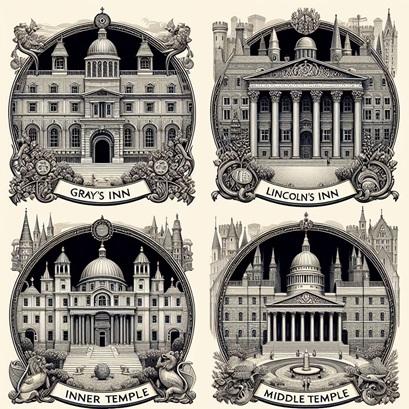The Inns of Court are professional associations for barristers in England and Wales. They are responsible for the training and qualification of barristers, who are the specialised courtroom advocates in the British legal system. Every barrister must belong to one of these Inns.
London’s Four Inns of Court are renowned for their rich history, prestigious legal education and significant role in shaping the British legal system.
These four Inns of Court are Lincoln’s Inn, Gray’s Inn, Inner Temple, and Middle Temple
Historical Origins of the Inns of Court
During the 12th and early 13th centuries, law was primarily taught by the clergy in the City of London. However, a papal bull in 1218 prohibited the clergy from practicing in secular courts. Laymen gradually took over legal practice and teaching. Guilds of law, modelled on trade guilds, eventually evolved into the Inns of Court.
The Four Inns of Court
Lincoln’s Inn
History: Established in the 14th century, The Honourable Society of Lincoln’s Inn is one of the oldest Inns of Court. It takes its name from the area of London where it is located. The Inn’s origins can be traced back to the legal lectures and apprenticeships that took place here in the medieval period. Over time, Lincoln’s Inn became a hub for legal education and practice, attracting aspiring lawyers from across England.
Notable Features: Lincoln’s Inn boasts impressive architectural heritage, with its stunning Great Hall dating back to the 15th century. The Chapel, Library, and Gardens further enhance its historic appeal.
Key Figures: Many distinguished legal minds have been associated with Lincoln’s Inn, including Thomas More, Lord Mansfield, and Lord Denning.
Gray’s Inn
History: The Honourable Society of Gray’s Inn, situated near Holborn, has origins dating back to at least the 14th century. Like other Inns, Gray’s Inn served as a place of legal study and networking for aspiring lawyers. Its members played significant roles in the legal and political spheres throughout history.
Notable Features: The Gray’s Inn Hall, built in 1560, is a highlight of this institution. The Walks, a serene garden area, provide a tranquil retreat in the heart of bustling London.
Key Figures: Francis Bacon, one of England’s most famous philosophers and statesmen, was associated with Gray’s Inn.
Inner Temple
History: The Honourable Society of Inner Temple, located in the Temple area of London, traces its roots to the Knights Templar, who originally owned the land. By the 14th century, it had become a significant legal centre. The Inns of Court played essential roles in legal education and fostering professional standards.
Notable Features: The Inner Temple Hall, completed in 1572, is an architectural gem with historical significance. The tranquil Inner Temple Gardens offer a serene escape amidst London’s bustling streets.
Key Figures: Sir Edward Coke, a renowned jurist and parliamentarian, was associated with Inner Temple.
Middle Temple
History: The Honourable Society of Middle Temple, adjacent to Inner Temple, also has medieval origins and was associated with the Knights Templar. It became a distinct legal institution by the late 14th century. Middle Temple has played a crucial role in legal education and professional development.
Notable Features: Middle Temple Hall, completed in 1573, is renowned for its grandeur and historic significance. The buildings and gardens of Middle Temple offer a captivating glimpse into London’s legal and architectural heritage.
Key Figures: Notable members include Sir Walter Raleigh and Lord Eldon.
In the late 20th century, many barristers’ chambers moved outside the Inns’ precincts due to growth in the legal profession and a desire for more modern accommodations. However, the Inns of Court continue to play a vital role in legal education and professional development.
In summary, the Inns of Court are not merely historical relics; they remain essential institutions for barristers, shaping legal practice and tradition to this day.
Check out our articles on Barristers, Direct Access Barristers, Bar Standards Board, Bar Standards Board Justice ?, Solicitors, Rule of Law and the highly questionable Sussex Family Justice Board.
Read the reviews of Junior Sussex Barrister Gavin Howe (Gray’s Inn)
“He is awful, underhanded and should not be practising law!”
and Legal 500 Junior Barrister Eleanor Battie (Lincoln’s Inn)
“She is a one-woman legal A Team”
Latest Articles
- What is a Paralegal ?A paralegal is a legal professional who performs tasks that require knowledge of legal concepts but does not hold the… Read more: What is a Paralegal ?
- What is a Judgment ?A judgment, also known as a judicial decision or court ruling, is the final decision made by a court of… Read more: What is a Judgment ?
- What is an Adverse Inference ?Adverse inference is a legal principle that plays a significant role in various areas of law, including criminal, civil, and family law. It arises… Read more: What is an Adverse Inference ?
- BarristersA barrister is anyone who has been Called to the Bar in England and Wales. For a barrister to offer… Read more: Barristers




